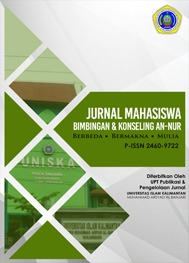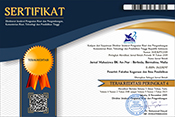KONTRIBUSI SELF ESTEEM TERHADAP KECANDUAN GAME ONLINE
(1) Dosen Universitas Jabar Ghafur
(*) Corresponding Author
Sari
Being addicted to online game is a kind detrimental behavior that could harm oneself. Such addiction is influenced by various factros, two of which are self esteem. This research aims to describe: (1) self esteem of the students of SMA Pertiwi 1 Padang, (2) students’ addiction to online games at SMA Pertiwi 1 Padang, (4) the contribution of self esteem toward the students’ addiction to online games, (5) the contribution of self esteem toward the students’ addiction to online games, This research applied quantitative approach and correlational technique. The population of the research was all of students registered in the second semester of Academic Year 2016/2017. By using purposive sampling technique, 243 students were chosen as the samples. The instrument of the research were inventory Self esteem (CFSE-2), the scale of addiction online games (KGO), and the scale self control (SC) by of Likert model. The data obtained were analyzed by using simple and multiple regression technique. The results of the research reveal that,: (1) the students’ self esteem could be categorized as “midle”, (2) the students’ self control and addiction to online games could be classified as “adequate”, (3) the students’ self esteem gives significant contribution (11 %). The implication of the research findings could be regarded as an input for the Guidance and Counseling teachers in designing guidance and counseling program for the the students.
Kata Kunci
Teks Lengkap:
PDFReferensi
Adams & Rollings. 2007. Fundamental of Game Design. (Second Edition). CA: Barkeley New Riders.
Akin, A., Arslan, S., Uysal, R., & Sahrane. 2015. “Self Control Management and Internet Addiction”. Journal International Online of Education Sciences, 7 (3): 95-100.
Albone, A. A., Nawi, M., & Khairani. 2009. Panduan Penyusunan Proposal Penelitian dengan Mudah. Padang: Yayasan Jihadul Khair Center.
Amelya, R. 2008. “Pelatihan Asertif untuk Mereduksi Perilaku Adiksi Online Game pada Remaja”. Skripsi tidak diterbitkan. Bandung: Jurusan PPB FIP UPI.
Basuki, H., & Afrinanda, Y. 2009. Self Esteem in Women Alcoholic Abus Work as a Waitress at the Bar. Thesis tidak diterbitkan. Undergraduate Program, Faculty of Psychology. Gunadarma University.
Baumeister, R. F., Stilman., & Gailiot. 2007. “The Strength Model of Self Control”. Journal Current Directions in Psychological Science, 9 (16): 351.
Branden & Nathaniel. 2005. Kekuatan Harga Diri. Terjemahan oleh Anne Nathalie. Batam: Inter Aksara.
Brian. 2005. “Addiction to the Internet and Online Gaming: Kecanduan internet & game online”. Journal Cyberpsychology & Behavior, 8 (8): 304-306.
Chapple, L. C. 2005. “Self Control Peer Relationship and Deliquency”. Journal Justice Quarterly, 22 (1): 89-96.
Clemes, H., & Bean, R. 2001. How to Teach Raise Childrens Self Esteem. Terjemahan oleh Anton Adiwiyoto. Jakarta: Mitra Utama.
Detria. 2013. “ Efektivitas Teknik Manajemen Diri untuk Mengurangi Kecanduan Online Game”. Skripsi tidak diterbitkan. Bandung: Universitas Pendidikan Indonesia.
Diurna, A. 2008. “Game Online Sebuah Fenomena Budaya Pergaulan Baru”. Jurnal of Cyberpsychological, 5 (6): 304-309.
Feist, J., & Feist. G. 2006. Theories of Personality (Sixth Edition). New York: McGraw Hill.
Gea, A. A., Wulandari, A. P. Y., & Babari, Y. 2003. Character Building I Relasi dengan Diri Sendiri. Jakarta: Gramedia.
Ghufron, M. N., & Risnawati, R. 2014. Teori-teori Psikologi. Yogyakarta: Ar-Ruzz Media.
Hidayat, T. 2011. 18 Maret. Di Razia Palajar Tidak Kapok Duduk di Warnet. Padang Expres. Hlm 5.
Iskandar. 2010. Metodologi Penelitian Pendidikan dan Sosial: Kuantitatif & kualitatif. Jakarta: GP Press.
Jap, Tiatri, Jaya, & Suteja. 2013. “The Development of Indonesia Online Game Addiction Questionaire”. Journal Pone, 8 (4): 1-5.
Kagan & Kiracuburun. 2016. “Self Esteem, Daily Internet Use and Social Media Addiction as Preditors Depression Among Turkish Adolescents”. Journal of Education & Practice, 1 (24): 64-72.
Karapetas, Zygours, & Fotis. 2014. “Internet Gaming Addiction Reasons Diagnosis Premention and Treatment Encephallos: Reasons, diagnosis, prevention and treatmen”. Journal of Mental Health & Addiction Encephalos, 51 (10): 112-120.
Kernis, M. H. 2003. “Toward a Conceptualization of Optimal Self Esteem”. Journal Psychological Inquiry, 14 (2): 1-26.
Kim, K. H., Park, J. Y., & Kim. D. 2002. “E-life Style and Motives to Use Online Games”. Journal Irish Marketing Review, 15 (2): 71-77.
Lieberman, D. A. 2006. Dance Game and Other Exegames: What the research says. Revisi and Expended, 3 (5): 373.
Lozen, G. 2009. “The Positive Effect of Online Games on Childern”. Journal Cyberpsychology & Behavior, 9 (5): 63-68.
Mark, D. G. 2004. “Demographic Factors and Playing Variables in Online Computer Gaming”. Journal Cyberpsychology, 7 (4): 479-487.
Mazalin, D., & Moore, S. 2004. “Internet Use Identity Development & Social Anxiety Among Young”. Journal of School Psychology, 25 (2): 131-148.
Mruk, C. J. 2006. Self Esteem Research, Theory, and Practice: Toward a positive psychology of self-esteem (Third Edition). New York: Springer Publishing Company, Inc.
Pahlevi & Riza. 2011. “Game Online: Pandangan umum mengenai implikasi sosial, psikologi dan ekonomi yang dihadapi pemain game”. Jurnal Psikologi, 2 (27): 3-14.
Prapatiani, S. 2013. “Pengaruh Kontrol Diri Terhadap Agresivitas Remaja dalam Menghadapi Konflik Sebaya dan Pemaknaan Gender”. Jurnal Sains & Praktik Psikologi, 1 (1): 12-19.
Prasetyo, B., & Jannah, L. M. 2011. Metode Penelitian Kuantitatif. Jakarta: Raja Grafindo Persada.
Republika. 2011. “Game Indonesia Juara Asia Online Game Award”. Jurnal Media Psychology, 12 (4): 23-27.
Rohan. 2009. Game Station-Indonesia Best Selling Game Megazine. Jakarta: Open Beta.
Santrock. 2007. Psikologi Pendidikan (Edisi Kedua). Terjemahan oleh Triwibowo. Jakarta: Kencana.
Sanyal, N., Fernandes, T., & Jain, A. 2016. “Leisure Boredom, Loniliness and Self-Control in Women Candy Crush Gamers”. Journal International of Science & Research, 5 (8): 2319-7064.
Soetjipto, P. 2001. “Pengujian Validitas Konstruk Kriteria Kecandua Internet”. Jurnal Psikologi, 32 (2): 74-91.
Steinberg, L. 2002. Adolescence (Sixth Edition). USA: McGraw Hill Higher Education.
Sudjana, N., & Ibrahim. 2002. Penelitian & Penilaian Pendidikan. Bandung: Sinar Baru.
Sugiyono. 2014. Metode Penelitian Kuantitatif, Kualitatif & Kombinasi (Mix dan Methods). Bandung: Alfabeta.
Suler, J. 2004. “Computer and Cyberspace Addiction”. Journal International of Applied Psychoanalytic Studies. 1 (4): 350-362.
Sunyoto & Danang. 2009. Analisis Regresi & Uji Hipotesis. (Edisi Pertama) Bandung: Alfabeta.
Syahran. 2015. “Ketergantungan Game Online dan Penanganannya”. Jurnal Psikologi Pendidikan & Konseling, 1 (1): 2-22.
Tangney, J. P., Baumeister, R. F., & Boone, A. L. 2004. “High Self-Control Predicts Good Adjustmen: Less pathology, better graddes, and interpersonal success”. Journal of Personality, 72 (23): 347-351.
Tetan, M. J. 2013. “Hubungan antara Self Esteem dan Prokrastinasi Akademik Pada Mahasiswa”. Jurnal Ilmiah Mahasiswa Universitas Surabaya, 2 (1): 1-17.
Twinomugisha, S. R. 2008. “The Relationship between Self Esteem and Academic Achievment”. Journal of Education & Practice, 6 (1): 213-309.
Usman & Akbar .2011. Pengantar Statistik. Jakarta: PT Bumi Aksara.
Rooij, V. 2011. “Online Video Game Addiction Exploring a New Phenomenon” [Phd Thesis] Rotterdam The Netherlands: Erasmus University Rotterdum.
Veral, E. P., & Moon, B. 2011. “An Emprical Test of Low Self-Control Theory Among Hispanic Youth”. Departmen of Criminology Justice, 9 (13): 103-207.
Walker. 2001. Control and the Psychology of Healt Theory: Measurement and applications. Philadelphia: Open University Press.
Wan, S. C., & Chio, W. B. 2006. “Whay are Adolescents Addicted to Online Gaming? An Interview Study in Taiwan”. Journal of Cyberpsychology & Behavior, 9 (6): 372-380.
Wright, B. R. E., Caspi. A., Moffit, T. E., & Silva, P. A. 1999. “Low Self Control, and Crime: Social causation, social selection or both”. Journal Criminology, 37 (3): 479-514.
Young. 2009. “Understanding Online Game Addictionand Treatment Issue for Adolescents”. Journal of Family Therapy, 37 (23): 29-35.
Yusuf, A. M. 2014. Metode Penelitian Kuantitaif, Kualitatif dan Penelitian Gabungan. Jakarta: Prenadamedia Group.
Zuzanti, Z. 2016. “Kontribusi Pengasuhan Orangtua dan Self Esteem terhadap Komunikasi Interpersonal Peserta Didik serta Implikasinya dalam Bimbingan dan Konseling”. Tesis tidak diterbitkan. Padang: Program studi S2 bimbingan dan konseling.
DOI: http://dx.doi.org/10.31602/jmbkan.v9i3.12597
Refbacks
- Saat ini tidak ada refbacks.
Akun Akademik Anda Terhubung dengan :
Didedikasikan Untuk:
Jurnal Mahasiswa BK An-Nur : Berbeda, Bermakna, Mulia disseminated below Lisensi Creative Commons Atribusi 4.0 Internasional.
















